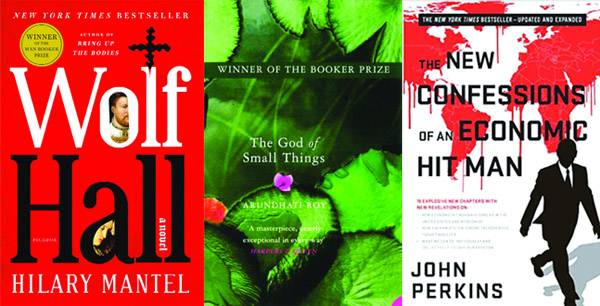
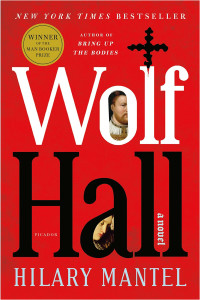
Wolf Hall
Hilary Mantel
Harper Collins (paperback), 2010
PRs 1115
England in the 1520s is a heartbeat from disaster. If the king dies without a male heir, the country could be destroyed by civil war. Henry VIII wants to annul his marriage of twenty years and marry Anne Boleyn. The pope and most of Europe opposes him. Into this impasse steps Thomas Cromwell: a wholly original man, a charmer and a bully, both idealist and opportunist, astute in reading people, and implacable in his ambition. But Henry is volatile: one day tender, one day murderous. Cromwell helps him break the opposition, but what will be the price of his triumph?
Reviews
Hilary Mantel’s Wolf Hall is a startling achievement, a brilliant historical novel focused on the rise to power of a figure exceedingly unlikely, on the face of things, to arouse any sympathy at all... This is a novel too in which nothing is wasted, and nothing completely disappears.” ?Stephen Greenblatt, The New York Review of Books
“Nothing in the last few years has dazzled me more than Hilary Mantel’s Wolf Hall... Magnificent.” ?Elizabeth Gilbert, author of Eat, Pray, Love
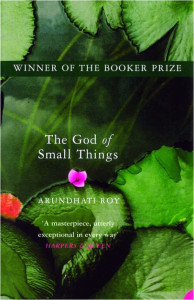
The God of Small Things
Arundhati Roy
Penguin (paperback), 2008
PRs 900
Compared favorably to the works of Faulkner and Dickens, Arundhati Roy’s debut novel is a modern classic that has been read and loved worldwide. Equal parts powerful family saga, forbidden love story, and piercing political drama, it is the story of an affluent Indian family forever changed by one fateful day in 1969. The seven-year-old twins Estha and Rahel see their world shaken irrevocably by the arrival of their beautiful young cousin, Sophie. It is an event that will lead to an illicit liaison and tragedies accidental and intentional, exposing “big things [that] lurk unsaid” in a country drifting dangerously toward unrest. Lush, lyrical, and unnerving, The God of Small Things is an award-winning landmark that started for its author an esteemed career of fiction and political commentary that continues unabated.
Reviews
“Dazzling . . . as subtle as it is powerful.” –Michiko Kakutani, The New York Times
“[The God of Small Things] offers such magic, mystery, and sadness that, literally, this reader turned the last page and decided to reread it. Immediately. It’s that hauntingly wonderful.” –USA Today
“The quality of Ms Roy’s narration is so extraordinary–at once so morally strenuous and so imaginatively supple–that the reader remains enthralled all the way through.” –The New York Times Book Review
“A novel of real ambition must invent its own language, and this one does.” –John Updike, The New Yorker
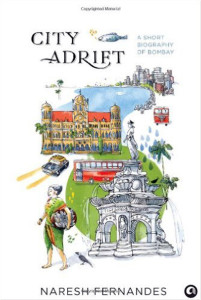
City Adrift: A Short Biography of Bombay
Naresh Fernandes
Aleph (hardcover), 2013
PRs 600
This is a historically researched story of seven conjoined islands, Bombay, rechristened Mumbai, after the fast vanished Koli fishermen’s goddess. Mumbai is etched through its choppy ups and downs of town planning, reclamation of land and ghettoisation since it came to the British as a dowry gift with a woman that the British King did not love. Its long history is in the hands of erudite treatment of Naresh Fernandez, whose admiration does not slump to nostalgia. His treatment holds on to the flying flag of critical analysis of politics of opium, cotton and textile domestic and overseas business that shaped it social ecology around the issue of reclamation of land as an urban space. The latter, based on historical documents of urban planning and malpractice, tell the sordid story of real estate speculation symbolised by Roychand, whose great grandson tried rescuing his legacy by organising a public function in 2002. The opium trade showed up in the production of tanchoi sarees and the coming of the Chinese community. Naresh Fernandez very succinctly portrays all this. An eminently readable tract that needs to be read and possessed by architects, urban planners, cultural and political mappers, general readers and Bandra elites who contribute practically nothing to its needs of humanitarian and public utility voices, like that of the author.
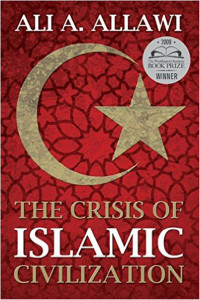
The Crisis of Islamic Civilization
Ali A. Allawi
Yale University Press (paperback), 2010
PRs 2230
Islam as a religion is central to the lives of over a billion people, but its outer expression as a distinctive civilization has been undergoing a monumental crisis. Buffeted by powerful adverse currents, Islamic civilization today is a shadow of its former self. The most disturbing and possibly fatal of these currents—the imperial expansion of the West into Muslim lands and the blast of modernity that accompanied it—are now compounded by a third giant wave, globalization.
These forces have increasingly tested Islam and Islamic civilization for validity, adaptability, and the ability to hold on to the loyalty of Muslims, says Ali A. Allawi in his provocative new book. While the faith has proved resilient in the face of these challenges, other aspects of Islamic civilization have atrophied or died, Allawi contends, and Islamic civilization is now undergoing its last crisis.
The book explores how Islamic civilization began to unravel under colonial rule, as its institutions, laws, and economies were often replaced by inadequate modern equivalents. Allawi also examines the backlash expressed through the increasing religiosity of Muslim societies and the spectacular rise of political Islam and its terrorist offshoots. Assessing the status of each of the building blocks of Islamic civilization, the author concludes that Islamic civilization cannot survive without the vital spirituality that underpinned it in the past. He identifies a key set of principles for moving forward, principles that will surprise some and anger others, yet clearly must be considered.
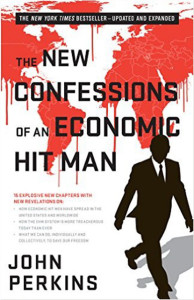
The New Confessions of an Economic Hitman
John Perkins
Ebury Press (paperback), 2016
PRs 1295
Former economic hit man John Perkins shares new details about the ways he and others cheated countries around the globe out of trillions of dollars. Then he reveals how the deadly EHM cancer he helped create has spread far more widely and deeply than ever in the US and everywhere else—to become the dominant system of business, government, and society today. Finally, he gives an insider view of what we each can do to change it.
Economic hit men are the shock troops of what Perkins calls the corporatocracy, a vast network of corporations, banks, colluding governments, and the rich and powerful people tied to them. If the EHMs can’t maintain the corrupt status quo through nonviolent coercion, the jackal assassins swoop in. The heart of this book is a completely new section, over 100 pages long, that exposes the fact that all the EHM and jackal tools—false economics, false promises, threats, bribes, extortion, debt, deception, coups, assassinations, unbridled military power—are used around the world today exponentially more than during the era Perkins exposed over a decade ago.
The material in this new section ranges from the Seychelles, Honduras, Ecuador, and Libya to Turkey, Western Europe, Vietnam, China, and, in perhaps the most unexpected and sinister development, the United States, where the new EHMs—bankers, lobbyists, corporate executives, and others—“con governments and the public into submitting to policies that make the rich richer and the poor poorer.”
But as dark as the story gets, this reformed EHM also provides hope. Perkins offers a detailed list of specific actions each of us can take to transform what he calls a failing Death Economy into a Life Economy that provides sustainable abundance for all.

